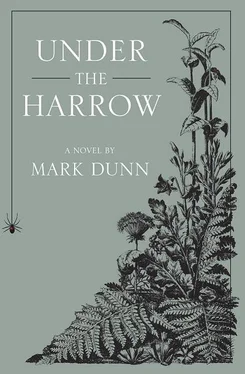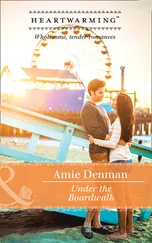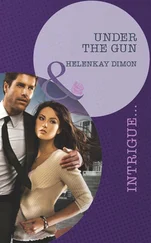I loved my father and hated my father but ultimately would not, could not with good conscience hold black feelings in my heart against his “dividend,” for Harry no more embodied the misdeeds of that man than did Gus or I. My heart softened.
“Sit,” said Harry, clasping my wrist with his hand. “Don’t go. Find it in your heart to accept me as your brother. Up to now you have helped my family and me out of a general sense of compassion for the most diminished amongst us. Now I ask that we vow to assist one another as brothers of the same blood.”
I sat down. For a long while I said nothing. And then suddenly there was very much to say: I told Harry Scadger about our nephew Newman, about how he had left the Dell, and how I now believed that he had returned. I told Harry Scadger about his half-brother Augustus who had gone off looking for Newman and whose whereabouts were now unknown. I didn’t forbear telling him everything that had been told to Sir Dabber and me by Dabber’s son Bevan. I spoke in more detail of the calculating device found in Dr. Towlinson’s office, which matched the description of that which had been found in the dead woman’s valise (this fact later confirmed when I was permitted to view the instrument in Harry’s custody). I took Harry Scadger into my confidence with few qualms, bolstered by the strong intuitive sense that ours would be an alliance upon which I could strongly depend. For Harry Scadger had no alliances or attachments of his own, save an allegiance to his brothers — an allegiance built more upon a sense of family obligation than upon an intellectual or philosophic commonality. I had Muntle and now Sir Dabber with whom to exchange theories and confidences. Harry had no one.
And so Harry Scadger and his wife Matilda and his son David and each of David’s siblings had sat and viewed the contents of the woman’s valise and had wondered within the circle of that family what it all had meant, and had wondered what words lived upon those damp papers from the Outland that Dr. Chivery had so hastily squirreled away. They had done this without context and without a clew as to how important these pieces could be to the great mosaic.
After a quiet and contemplative interval, I turned the subject to our detached childhoods, Harry obliging me by describing in broad strokes and a little pin-point the conjoined lives of his half-brothers and himself. He spoke of his deceased stepfather and mother, and I, in turn, told of the father that Harry had never known except through the man’s paternal patronage, and of Harry’s half-brother Gus, whom Harry had met only in passing. I fought back tears to recall the hard life that Gus had led (a life I could not help fearing in dark, quiet moments had now come to tragic end).
By the close of that long brotherly colloquy, the tavern was become a much duskier and far sleepier place than it had been upon our arrival, even the labouring men who had been in the beginning a bit loud and boisterous now slumping groggily in their chairs. In the hush of that deadened room, we soon heard the click of the street door handle being turned, and then saw the sharp angle of summer evening sunlight slicing across the hunched backs and shoulders of some of the tavern’s inmates. We beheld a young man standing proudly erect within that fog of dust motes suddenly illumined, and I could tell from the shape of his youthful silhouette that it was Dr. Mulberry Timberry. Cupping his eyes to better see into the room’s darkness, the doctor made us out, and strode briskly toward us, letting the door behind him close with a muted catch.
“Good evening, gentlemen,” said he. “You both look worn and weary. I was told that this was a lively, convivial place.”
“Dr. Timberry,” I said, rising to my feet to better formalise my introduction, “I’d like you to meet…my brother Harry.”
“ Half -brother, to be precise,” Scadger corrected me. “The time had come, you see, for me to tell my friend Frederick that he is a bit more to me than friend and that he has, in fact, a blood relation in the apricot line.”
Timberry shook his head in amazement. He was eager to hear the story of our linked parentage, but not as eager to address the condition of Harry’s oldest daughter; whilst Florence was not amongst the worst consumptive cases he had seen in his studies of the disease at the Lung Hospital, she was, nonetheless, in a very bad way, and if we did not treat the illness quickly and aggressively, she would, by his estimation, succumb within two or three months.
I thought of Ruth Wolf and how she had healed Bevan Dabber with her Outlander drugs. Were there drugs that doctors used for consumptives in the Terra Incognita? Was this disease, often referred to by its scientific term “tuberculosis,” as deadly a scourge amongst Outlanders as it was in the Dell? I would not be shy about asking this of Miss Wolf in my very next encounter with the woman. Nor would I forbear asking her about a good many other things now that I knew her true identity to be that of covert expatriate Beyonder.
Chapter the Thirty-sixth. Thursday, July 3, 2003
 nwittingly, I took a page from Muntle’s book.
nwittingly, I took a page from Muntle’s book.
I left the East End and journeyed back across the Westminster Bridge, only to find myself gravitating inexorably to the Heavenly Rest Memorial Cemetery. Passing first beneath the great iron entry arch, I bent my steps toward the gravestones of my mother and my father (who now I knew to be the father of Harry Scadger as well) and to the gravestone of the love of my young life, Fanny Lumbey. Then, my obligatory obeisances having been made, I began to wander about in aimless reflection, finally coming to rest upon the “Bench of Perpetual Memory” dedicated to Muntle’s brother George.
I wondered as I sat there how long my own brother must be gone from the Dell before I should consider putting in a bench in honour of his memory. I wept in this spot, not only over the potential loss of my brother, and the veritable loss of my mother and father and my dear Fanny, but also over the impending loss of my ancestral home. Because I knew in my soul that the only reason that prosperous, well-settled men such as Pupker and Feenix and Fitz-Marshall should pack their bags and leave Dingley Dell was this: that the valley was soon to change in some dark and perilous way that I could not begin to fathom. It was a fearful thought, but one that also beset me with a sense of great sadness.
I bowed my head and stared abstractedly at the green grass cushioning my feet. It was some time before I raised my head again and I did so because I heard my name being invoked by one who had come upon me. The voice belonged to my friend Sheriff Muntle.
“Ah,” he said, “you have found some comfort, communing with the spirit of my lost brother?”
I shrugged. I pulled myself heavily from the bench. “You were away at the Chowser School longer than you said you would be.”
“I have asked Maggy to marry me.”
“And did she accept?”
“Aye. We are to be wed as soon as circumstances permit. There is, of course, the minor matter of where we shall live. Chowser doesn’t wish to lose his valuable cook, and this is no time at all for me to resign my position as sheriff. Let us walk, Trimmers. We must go to Fingerpost. Your sister-in-law needs you. She is newly returned from Hungerford and has just received news of Gus’s journey into the Outland. You should have sent word to me, for it came as a shock to me as well.”
“There was nothing that you could have done. I didn’t wish to cast a cloud upon your visit with Miss Finching.”
“Still, I am your friend.”
Читать дальше

 nwittingly, I took a page from Muntle’s book.
nwittingly, I took a page from Muntle’s book.










